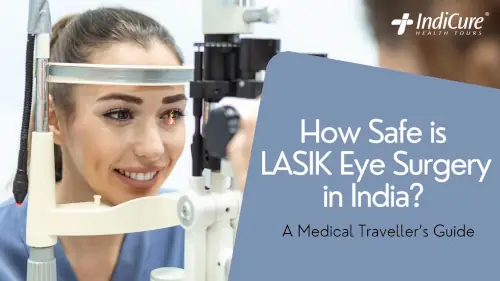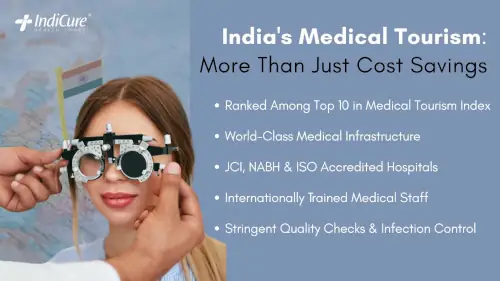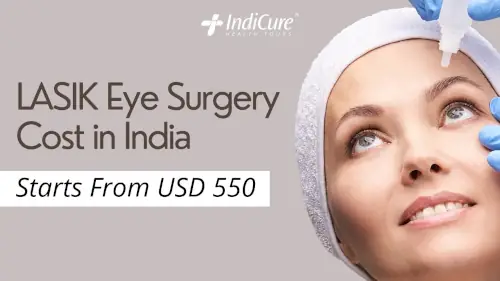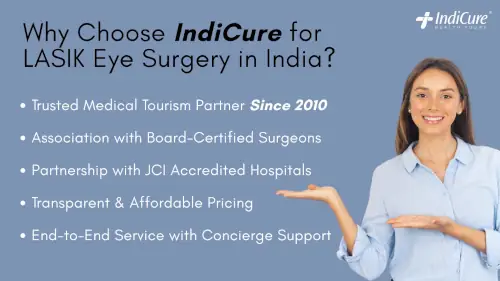How safe is LASIK eye surgery in India? A Medical Traveller's Guide

Introduction
Consider this situation: When Sarah from Toronto received her LASIK quote of CAD 4,500 per eye, she nearly choked on her morning coffee. As a freelance graphic designer without comprehensive health insurance, the $9,000 total felt like a mountain she couldn't climb. That's when she started wondering: could she get the same quality care elsewhere for a fraction of the cost?
If you're reading this, chances are you're in a similar boat. You're tired of fumbling for glasses in the morning, sick of dry contact lenses, and ready for the freedom that LASIK promises. But the sticker shock of surgery in Western countries has you exploring alternatives. India keeps coming up in your research, but one question haunts you: How safe is LASIK eye surgery in India?
To answer this question, it is important we dive deep into facts regarding LASIK eye surgery and how your choice matters in the present and future.
The Reality Check: Why LASIK Costs So Much in the West
Before we explore India's safety record, let's acknowledge the elephant in the room. In countries like the United States, Canada, Australia, and the UK, LASIK surgery can cost anywhere from $3,000 to $6,000 per eye. That's $6,000 to $12,000 for both eyes. This money could cover a year's worth of rent, a reliable car, or your child's college fund.
The harsh reality? Most insurance plans classify LASIK as "cosmetic" or "elective," leaving you to foot the entire bill. For middle-class families already stretched thin by rising costs of living, this puts a clear vision in the "luxury" category, which feels pretty unfair when you can't see clearly enough to drive safely at night.
India's Medical Tourism Revolution: More Than Just Cost Savings
India is slowly emerging as a global powerhouse in medical tourism, attracting over 1.8 million international patients annually. This is not coincidental, but rather a result of decades worth of investment in the right medical infrastructure, training, and technology.
India's medical facilities are now setting a high standard in terms of safety and ethical practices in comparison to other nations. Patient safety and quality of care are now a priority for several hospitals treating international patients with accreditations like JCI (Joint Commission International), NABH (National Accreditation Board for Hospitals), and ISO certifications.

These standards indicate rigorous standards that must be upheld by all hospitals to maintain their funding and care. Starting with surprise inspections and mandatory safety protocols, which are integrated within the hospital's operational policies. Other factors, such as equipment maintenance, infection control standards, and staff training, are all standards these hospitals take seriously.
The Technology Question: Are Indian Eye Clinics Using Outdated Equipment?
There is often a misconception regarding Indian technology being outdated, which might be one of your biggest concerns. These may all be valid and understandable; however, the reality of the situation might surprise you that LASIK procedures are very safe. Some of these clinics also hold a US-FDA-approved certification, and the best eye hospitals in India use the same FDA-approved laser systems, which might be available in several premium clinics in New York or London.
The major LASIK laser manufacturers, including VISX, Alcon, Bausch & Lomb, and others, have a global presence. The same machines performing surgeries in Beverly Hills are often performing surgeries in Mumbai or Delhi. The technology doesn't change based on geography, and manufacturers maintain the same quality standards worldwide.
When you're researching clinics, you'll want to ensure they're using FDA-approved excimer lasers. The most trusted brands include VISX Star S4 IR, Alcon WaveLight, and Bausch & Lomb Technolas. These aren't just fancy names; they represent decades of research and development in laser vision correction.
Beyond the lasers themselves, modern clinics should have sophisticated diagnostic equipment like corneal topographers and wavefront analysers for precise measurements of your eye. These machines create detailed maps of your cornea, ensuring the laser treatment is perfectly customized to your unique eye structure.
The surgical suites should meet the same standards you'd expect in any Western operating room, which include laminar airflow systems, positive pressure rooms, and HEPA filtration systems that keep the environment sterile and safe. When you visit a quality clinic in India, you'll often find that its facilities are newer and more modern than many established clinics back home.
The Surgeon Factor: Training and Experience
Equipment is only as good as the hands that operate it, and this is where India truly shines. The best eye doctors of India have trained at prestigious institutions in the US, UK, or Europe before returning home. Others have completed fellowships at renowned eye centres worldwide, bringing back cutting-edge techniques and best practices.
What's particularly impressive is how many Indian eye surgeons stay current with global developments in their field. They regularly attend international conferences, participate in research, and maintain memberships in prestigious ophthalmology societies. This isn't just about credentials on paper; it's about a commitment to excellence that translates directly to patient care.
When you're evaluating an eye surgeon, you'll want to know about their experience level. How many LASIK procedures have they performed? A seasoned surgeon should have thousands of successful procedures under their belt. You'll also want to understand their educational background and ongoing training. The best surgeons will be completely transparent about their credentials and happy to discuss their approach to patient care.
Don't hesitate to ask for references from previous international patients. A surgeon who regularly treats medical tourists will have a network of satisfied patients who are often willing to share their experiences. This peer-to-peer feedback can be incredibly valuable in making your decision.
Safety Protocols: What Happens When Things Go Wrong?
Let's address the fear that keeps many people awake at night: What if something goes wrong during or after surgery? And again, the haunting question: How safe is LASIK eye surgery in India? These concerns are completely natural, and reputable Indian eye clinics understand this anxiety. That's why they follow the same rigorous safety protocols as top-tier Western clinics.
The process begins long before you even enter the operating room. Comprehensive pre-operative screening includes detailed eye exams to rule out conditions that might make you a poor LASIK candidate. Your surgeon will measure your corneal thickness, assess your pupil size, and screen for dry eye syndrome. If you're not an ideal candidate, a good surgeon will tell you honestly rather than proceed with a risky surgery.
During your consultation, you should never feel rushed into making a decision. The informed consent process should include detailed discussions about risks, benefits, and alternatives. You deserve to understand exactly what you're signing up for, and any pressure to decide quickly should be a major red flag.
The surgical protocols themselves maintain the highest standards of sterile technique, proper laser calibration, and real-time monitoring throughout your procedure. Your surgeon will be tracking your eye movements and making micro-adjustments to ensure optimal results.
After surgery, you'll receive detailed follow-up schedules and crystal-clear instructions for your recovery. The best clinics provide 24/7 contact information for any concerns that arise during your healing process.
The Numbers Don't Lie: LASIK Safety Statistics
Globally, LASIK has an excellent safety profile. According to multiple studies, serious complications occur in less than 1% of cases, regardless of where the surgery is performed. The most common side effects include dry eyes, night vision issues, or under-/over-correction. These are typically temporary and manageable.
What's crucial to understand is that these statistics hold true for properly performed LASIK procedures, whether they happen in Houston, Toronto, or Mumbai. The key is choosing a qualified surgeon and an accredited facility.
The LASIK Cost Reality in India: What You Can Expect to Save
Here's where the numbers get really interesting. In India, the cost of LASIK eye surgery starts from USD 550 per eye for high-quality LASIK, compared to $2,500-4,000 per eye in Western countries. That's a potential savings of 50-70%, even after factoring in travel expenses.

But here's what's crucial to understand: these aren't "discount" procedures or corner-cutting measures. You're paying less because of fundamental economic differences. India has lower operational costs, favourable exchange rates for Western currencies, and government incentives that encourage medical tourism. Additionally, many Indian hospitals perform higher volumes of procedures, creating economies of scale that benefit patients.
The savings extend beyond just the surgery itself. Recovery time in India often costs a fraction of what you'd pay for accommodation in Western countries. Many patients find they can afford to stay longer, ensuring better recovery and more thorough follow-up care than they might manage with a quick turnaround at home.
When you factor in the potential for combining your medical treatment with a vacation experience, the value proposition becomes even more compelling. You're not just saving money on surgery, you're potentially getting a life-changing experience that includes exploring one of the world's most fascinating countries.
Choosing the Right Medical Tourism Partner for Your Journey
This is where the rubber meets the road. Medical tourism isn't just about finding the cheapest option; it's about finding the right balance of quality, safety, and affordability. You need a trusted partner who understands both the medical and logistical aspects of your journey.
IndiCure Health Tours has been facilitating safe, successful medical tourism experiences for over a decade and a half. They understand that choosing to have surgery abroad isn't just a financial decision; it's a leap of faith. That's why IndiCure works exclusively with JCI-accredited hospitals and internationally trained surgeons who meet the highest safety standards.

IndiCure's process includes:
- Comprehensive Screening: We review your medical history and current eye health to ensure you're a good LASIK candidate before you travel.
- Surgeon Matching: We connect you with board-certified eye surgeons whose experience and expertise match your specific needs.
- Transparent Pricing: No hidden fees or surprise costs. You'll know exactly what you're paying for upfront.
- Concierge Support: From airport pickup to post-surgery follow-up and drop back to the airport, we handle the logistics so you can focus on your recovery.
- Quality Assurance: We only work with facilities that meet international safety and quality standards.
Conclusion: How safe is LASIK eye surgery in India?
The honest answer to the haunting question of 'how safe is LASIK eye surgery in India' is: it can be extremely safe, but it depends on the choices you make. Just like you wouldn't choose a surgeon based solely on price in your home country, you shouldn't do it when considering medical tourism.
The key is doing your homework, asking the right questions, and working with experienced professionals who prioritize your safety above all else. When done right, LASIK in India can provide you with excellent results at a fraction of the cost you'd pay at home.
Remember Sarah from the beginning of this blog? She had her LASIK surgery in Mumbai eighteen months ago. Today, she's back to focusing on her design work without the daily hassle of glasses or contacts. More importantly, she didn't bankrupt herself to get there.
Your vision is precious, and you deserve to see clearly without financial strain. With proper research and the right support, LASIK in India with IndiCure Health Tours can be both safe and life-changing.
Ready to Take the Next Step?
If you're ready to explore your options for safe, affordable LASIK surgery in India, IndiCure Health Tours is here to help. IndiCure has helped thousands of patients from around the world achieve clear vision while saving significant money. Sounds hard to believe? Take a look at IndiCure's patient testimonials speak volumes about their care and results.
Contact IndiCure today for a free consultation. They will review your specific situation, answer all your questions, including your concerns about how safe is LASIK eye surgery in India, and help you determine if medical tourism is right for you. Because everyone deserves to see clearly, regardless of their insurance coverage or location.
Your journey to a clear vision starts with a single step. Let IndiCure in India help you take it safely and confidently.